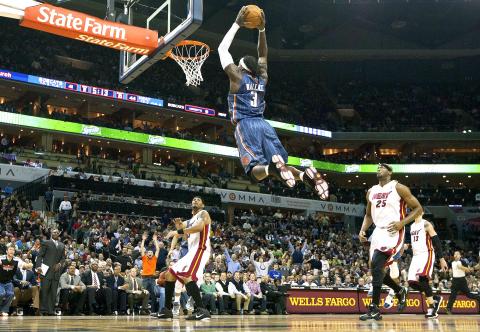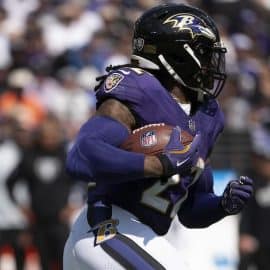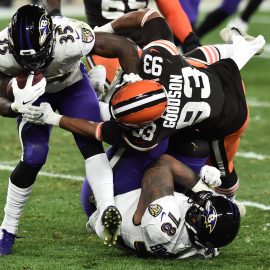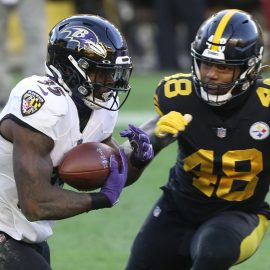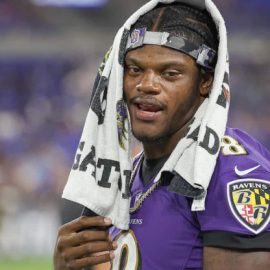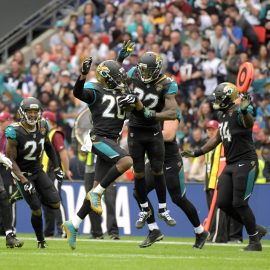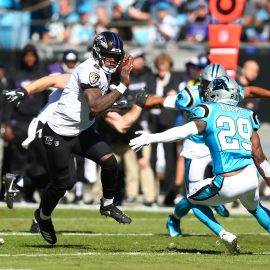Okay, this is to say I’m officially NOT buying into global warming theory…Crabtown is 10 degrees F. at the airport as I write this, we’ve just posted the coldest December and January combo since 1950… and the Ravens are not playing in the Final Four on Sunday. Good luck to the Jets, hope they beat the Steelers…what a crap-shoot!
What better time to curl up with the best book ever written on the Ravens than this?
This is not a paid commercial, dear fans. This is a book worth owning and reading….if you’re a true Ravens follower. It was published in 2005, but still portrays the elan and the tension of your 2011 Ravens.
Ironically, I first got turned on to John Feinstein for his books about pro golf… yes, golf. Feinstein wrote a book called “A Good Walk Spoiled”… and I was mesmerized by his literary mastery in the telling of the tale. He eventually brought his talents to the world of pro football. Since Feinstein is a resident of Maryland, and a huge fan of the Navy football program in Annapolis (as well as a weekly radio color analyst for Navy football broadcasts on WBAL), I was immediately hooked on his Ravens project.
If nothing else, Feinstein gives you total access into the world of what is known as “the Ravens’ Way”…
I’ve kept a yellowed, tattered and torn review of the book by Emily Flake of the Baltimore City Paper in my desk for almost 6 years now. I don’t think I can improve on Emily’s impression of the book, so here it is:
“Americans love violent sports,” John Feinstein says from a hotel room in Orlando, a stop on his press tour for his recent book, Next Man Up: A Year Behind the Lines in Today’s NFL. Discussions of native bloodlust notwithstanding, the New York-based Feinstein is an affable sort, cheerfully lending a few moments of his time to talk about the game he loves and knows so well. Taking a page from David Simon and Ed Burns’ The Corner, Feinstein spent a year embedded in a Baltimore institution, albeit one where the violence is more likely to result in broken bones and ruined careers than murder and prison sentences—the Baltimore Ravens. Feinstein spent the entire 2004 season with the team, chronicling its less-than-triumphant arc from start to finish.
“There’s something about watching these giants slam into each other, while also completing a graceful play, a beautiful throw,” he continues. “It just grabs people.”
It certainly does. Of all America’s sports, football looms the largest in the nation’s psyche. And the National Football League enjoys a Mafia-like power over its broadcasters. In 2003 ESPN launched a fictional drama called Playmakers, depicting NFL players as drug-addled, skirt-chasing louts, and NFL Commissioner Paul Tagliabue went ballistic. When he threatened to relieve ESPN of its Sunday night games unless Playmakers was pulled, the sports network caved. Meanwhile, the 1994 Super Bowl in Atlanta’s Georgia Dome had 144.4 million pairs of eyeballs on it—more than any other program in the history of television.
Remarkably, Feinstein makes his report accessible even to the rank layman. The access Feinstein was able to wangle is extraordinary, earning him a free pass to locker rooms, meetings, games, anything, this despite the NFL’s notorious caginess around the media, usually cloaking its affairs in a Skull and Bones-level secrecy.
And it’s the peek into this secret society that lends Next Man Up its allure. Feinstein is a sportswriter of considerable merit, with 17 books under his belt. He enjoyed an 11-year stint at The Washington Post as a political and sports writer, as well as putting in time with Sports Illustrated and National Sports Daily. Next Man Up is written in a style both approachable and meticulous, no mean feat when it comes to a subject as fraught with minutiae and statistics as professional sports. The Byzantine structure of league rules and regulations is awe inspiring. You’re talking about an institution that deploys someone called a “Clothes Nazi” to make sure players’ uniforms are up to code, even down to the towel some tuck into their waistband to keep their hands dry during a game. Six inches, that’s all the towel a man can have, leading to amusing sequences, such as one that finds Deion Sanders trimming two inches off his outsize rag to be in compliance.
Since we know at the outset that 2004 was not a stellar year for the Ravens—the team finished a disappointing 9-7, which is spectacular compared to their 2005 record—it was probably not necessary to give detailed reports of all 16 games they played. If you’re fan enough to get through those passages, you’ll likely know what happened anyway. The real interest lies in what happens off the field, and Feinstein’s fly-on-the-wall perspective lets it all out. Almost every player and key personnel member is given at least a few paragraphs of background, some of which is interesting, but some of which gets lost due to plain overcrowding. There are an awful lot of people in this book, and it can be difficult to keep them straight, but you’re unlikely to get more intimate with key Ravens than you are here.
Head Coach Brian Billick is one of the more interesting subjects. Blunt and hotheaded, he is also given to using pop psychology in his daily operations. He’s as comfortable using terms such as “stacking”—meaning letting one stressor pile on top of another until the whole stack just blows—as he is using the colorful jargon of the guys (see “slapdick,” a hapless or ineffectual player). Vice President/General Manager Ozzie Newsome is the rock of the team, a calm and measured presence whose words carry all the more weight for his not throwing them around too liberally.
While Feinstein is clearly sympathetic to his subjects, he doesn’t lionize them. He deals evenhandedly with the charges leveled at Jamaal Lewis for drug trafficking—charges that landed the running back four months in jail. Feinstein makes quietly clear the harshness of that plea bargain without screaming “unfair.” He depicts Ray Lewis as the heart and soul of the team without glossing over the murder charges brought against the linebacker in 2000.
Feinstein is also unstinting in his reporting some poorer traits. Players showboat, have crappy attitudes, are late to meetings. Coaches lose their tempers, yell at the players, yell at each other. Nice guys lose their shit entirely and scream at their compatriots at the worst moments. The pressure gets to everybody. Beyond pounding their bodies into a pulp, players live with the knowledge that they can be cut the minute they are no longer propelling the team toward a win. Coaches don’t have it much easier.
Nobody’s job is secure, and the tension Feinstein describes is incredible. In a particularly wince-inducing scene, quarterback Kyle Boller, doing a little press on a call-in radio show, stoically endures the wrath of a caller who calls him useless and a disgrace to the team. How many of us, in civilian life, have to live every moment of our careers under the public’s microscope? Even the title of Feinstein’s book reflects the fact that their jobs are always on the line, and other, hungrier athletes are waiting to take their places.
Perhaps this pressure, and its less public corollaries in the current American workplace, are a part of why the dramas of football resonate so in this country—particularly when paired with its violent nature and camera-ready perfection as a television sport. Few other athletic endeavors enjoy that particular perfect storm.
“Hockey’s a terrible television sport,” Feinstein says of the national pastime of our neighbor to the north. “The puck’s just too small, you can’t really see it on the screen.”
Similarly, sports popular worldwide have yet to take hold here. “When I started at The Washington Post in the ’70s, everyone said soccer was the sport of the ’80s,” Feinstein says. “It’s just not gonna happen here.”
Feinstein has a point—and certainly you couldn’t command the kind of advertising dollars thrown around in the States for a game composed of two unbroken 45-minute stretches. And soccer, basketball, baseball—they all lack the meaty thumps of football, the raw power of behemoths smashing into other behemoths. Football players are more than men, they’re cartoonish ur-males, their shoulders made even broader by the pads, their faces obscured by shiny helmets. Ravens center Mike Flynn says of the spectacle made of the teams entrance to the field: “You come out of that tunnel, you feel like you’re a god.”
Feinstein mostly avoids the Mount Olympus comparisons, keeping hyperbole to a respectably low level, but Flynn’s words reflect a certain, if bittersweet, truth. These players are disposable gods, thrown away every day for being broken, or too expensive, or just plain not good enough. And in his lively reporting from the front lines, Feinstein has written an engaging and informative book about that struggle.
Thank you, Emily. Man, if you ever needed a blueprint to the psychological history and profile of this Ravens football organization, then “Next Man Up” is a must-read….
Add The Sports Daily to your Google News Feed!
